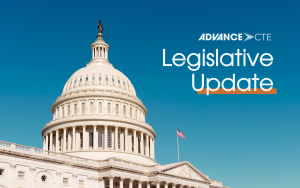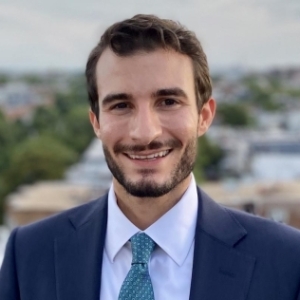 This week lawmakers remained on spring recess and are expected to return next week for a busy two-week work period. Elsewhere, the U.S. Department of Education (ED) announced a delay in anticipated postsecondary regulations impacting career education programs.
This week lawmakers remained on spring recess and are expected to return next week for a busy two-week work period. Elsewhere, the U.S. Department of Education (ED) announced a delay in anticipated postsecondary regulations impacting career education programs.
Lawmakers Include Focus on Appropriations and WIOA in Next Work Period
Congress is on recess this week, but legislators are scheduled to return to Washington, D.C. for a two-week work period on April 8. Broadly, Advance CTE expects Congress to focus its efforts this month on the recent bridge collapse in Baltimore, Maryland and an international aid package. In addition, lawmakers in the House are expected to consider H.R. 6655—legislation that would reauthorize the Workforce Innovation and Opportunity Act (WIOA). As a reminder, leaders on the Senate Health, Education, Labor, and Pensions (HELP) Committee are continuing to separately negotiate their own version of WIOA reauthorization with a current target date for action around Memorial Day later this year.
As wider Senate and House floor discussions evolve, the Appropriations committees are beginning to formally start the federal fiscal year 2025 (FY25) appropriations process. This normally entails bringing the leaders of federal agencies to Capitol Hill to testify regarding their Department’s annual budget requests. Advance CTE expects an initial appropriations hearing in the House to take place sometime next week and will be monitoring these efforts closely as the organization works to strengthen the federal investment in Career Technical Education (CTE) via the Carl D. Perkins CTE Act’s (Perkins V) basic state grant program.
However, these efforts may be delayed somewhat as the Republican Steering Committee is expected to meet early next week to discuss who will lead the House Appropriations Committee, following an announcement late last month from current Appropriations Committee Chair Kay Granger (R-TX) that she would step down from this role. At present, longtime appropriations leader Rep. Tom Cole (R-OK) appears to be heavily favored to be recommended for this leadership position following public support from several other House Republican appropriations leaders. However, Rep. Aderholt (R-AL), currently the chair of the appropriations subcommittee responsible for workforce funding, has circulated a Dear Colleague letter indicating that he is seeking broader changes to the appropriations process. “Instead of hastily selecting a new Appropriations chair, I believe that now is the time to focus on correcting the process and developing our theory of government on how we will manage our responsibilities,” he wrote in part.
As these efforts continue to take shape, Advance CTE will be engaging with both the WIOA reauthorization and appropriations processes closely during this upcoming work period.
Gainful Employment Regulations Delayed
Late last week, the U.S. Department of Education issued a Dear Colleague letter delaying the implementation of reporting requirements for forthcoming Gainful Employment (GE) and Financial Value Transparency (FVT) regulations. While most of the new rules for GE and FVT will go into effect July 1 of this year, postsecondary institutions and covered programs will now have until October 1 of this year to begin reporting the necessary data to ED to begin implementation of these new regulatory frameworks. As a reminder, GE rules apply to certain postsecondary career education programs and determine their eligibility for federal student financial aid from Title IV of the Higher Education Act (HEA) based on programs’ ability to meet certain performance standards related to graduates’ earnings and ability to pay back student loans.
While GE rules apply to only a subset of postsecondary institutions and programs and include related sanctions in the form of losing Title IV eligibility, new FVT rules will apply to a much broader segment of the higher education sector without related penalties for low-performance. Advance CTE examined these rules in more detail last year when a final rule was published by ED.
This delay comes after a bipartisan group of Senators sent a letter to ED encouraging a delay of these new rules as ED continues to struggle with the implementation of the Free Application for Federal Student Aid (FAFSA) forms. In addition to the delay in reporting requirements, ED has also indicated that it will be issuing additional guidance for GE and FVT implementation sometime this month. More information on these announcements can be found here and here.

